Polar Meltdown

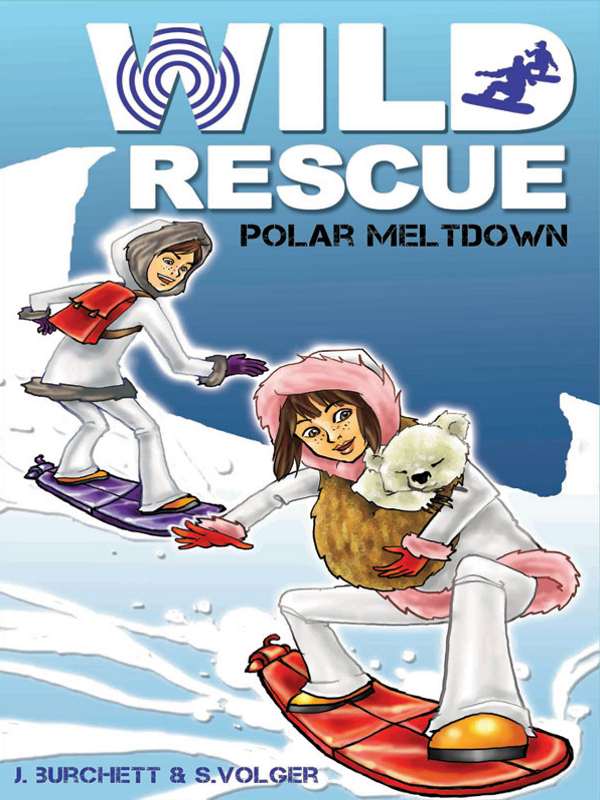
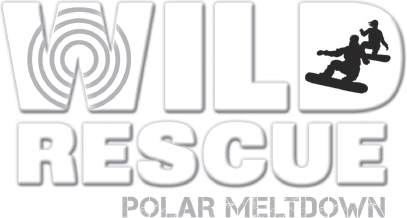
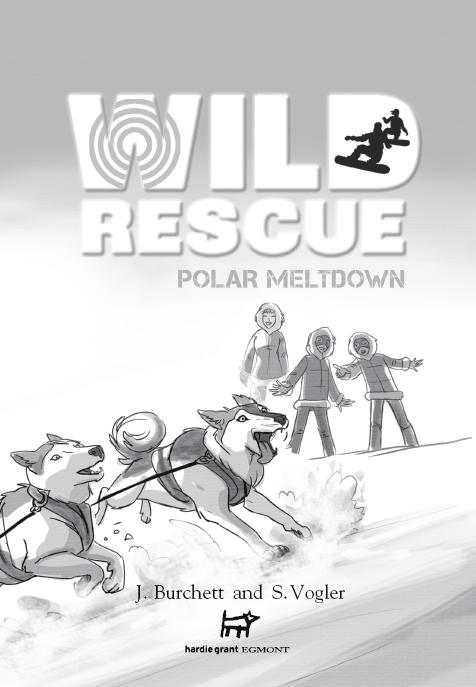
Wild Rescue: Polar Meltdown
published in 2011 by
Hardie Grant Egmont
85 High Street
Prahran, Victoria 3181, Australia
www.hardiegrantegmont.com.au
First published by Stripes Publishing
1 The Coda Centre, 189 Munster Road
London SW6 6AW
All rights reserved. No part of this publication may be reproduced, stored in a retrieval system or transmitted in any form by any means, electronic, mechanical, photocopying, recording or otherwise, without the prior written permission of the publishers and copyright holders.
A CiP record for this title is available from the National Library of Australia.
Text copyright © 2009 Jan Burchett and Sara Vogler
Illustrations copyright © 2009 Dianne Le Feyer of Cartoon Saloon
Cover illustration and design © 2011 Hardie Grant Egmont
Printed in Australia by McPherson's Printing Group
1 3 5 7 9 10 8 6 4 2
FOR POLAR BEARS INTERNATIONAL
FOR ALL THEIR IMPORTANT
WORK ON BEHALF OF THESE
MAGNIFICENT ANIMALS - JB & SV
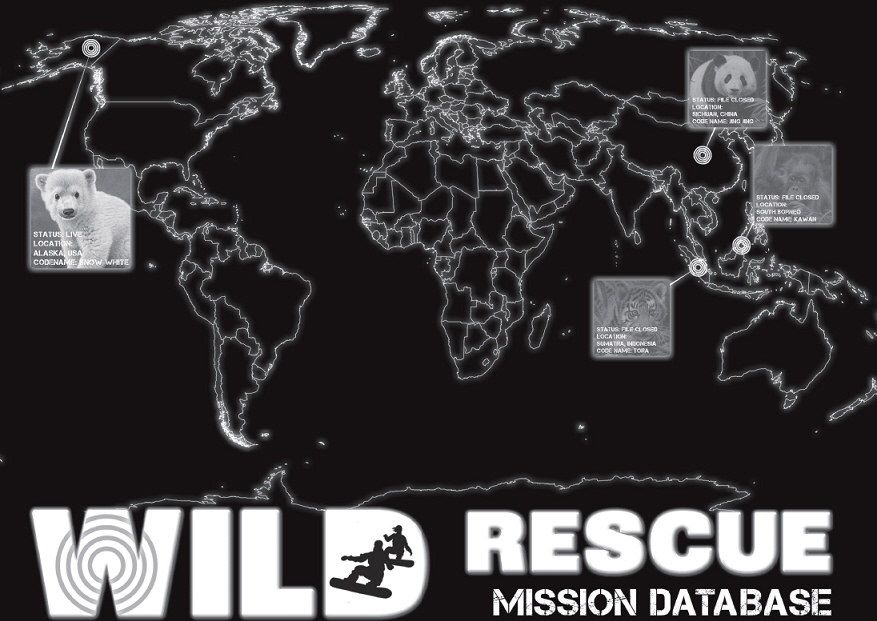
CONTENTS
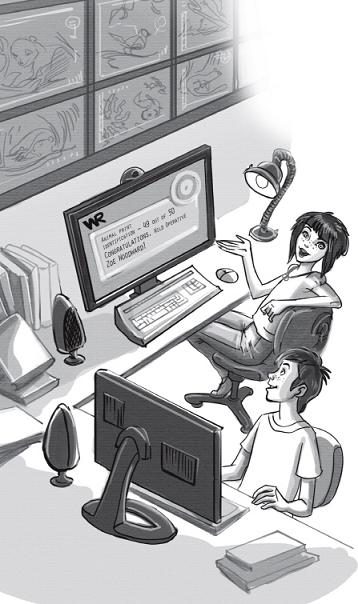
“Finished before you!” declared Zoe, hitting enter on the keyboard in front of her. Her result flashed up on the screen: “Animal print identification quiz â 49 out of 50. Congratulations, Wild Operative Zoe Woodward!”
“I've got them
all
right,” boasted Ben, her twin brother, as he finished seconds after her. He looked at Zoe's results. “Fancy not knowing the shape of the moose hoof!”
“Well, it's hard,” protested Zoe. “All the deer prints are so alike. I had to guess.”
Ben grinned. “So did I,” he admitted. He pushed his chair back and looked round at the state-of-the-art education centre, with its row of computer terminals and huge resource area full of books and manuals, maps and charts. “This place is so cool,” he said. “In fact, everything we've done here at Wild HQ has been awesome. The climbing wall was the best.”
“The water sports were my favourite,” said Zoe. “Especially the canoeing.”
Ben and Zoe were very unusual eleven-year-olds. They were the youngest operatives in Wild, a top-secret organisation dedicated to saving endangered animals. The head of the organisation, their godfather Dr Stephen Fisher, had invited them to spend the Easter holidays at his headquarters hidden deep underground on a remote island. They'd been undertaking a series of exercises to sharpen up their physical and mental skills for future Wild missions â endurance challenges, advanced satellite tracking and finally a series of brain boggling tests.
“I'll be sorry to go back home,” said Zoe.
“We've had a great time,” agreed Ben. “I wish we could stay longer.”
The door slid open and the lanky figure of Uncle Stephen appeared. He was wearing a white lab coat, a straw hat and bright stripy shorts. Zoe tried not to giggle.
“Well done, Ben and Zoe,” he said. “You've passed all your challenges with flying colours. Just one last little identification test.”
He tossed them a glass eye. Ben snatched it out of the air before Zoe could get her hands on it. They looked at each other in excitement. They knew what the eye meant. They weren't going home after all. Uncle Stephen must have a new rescue mission for them!
They peered at the eyeball. This was their uncle's little clue to get them to guess the animal in danger.
“It's dark,” said Ben, “and the pupil's huge.”
“Looks like my old teddy bear's eye,” joked Zoe.
“You're getting close,” said Dr Fisher.
“The most endangered bear I can think of is the polar bear,” said Ben.
“Quite right!” Their godfather beamed. “And I've got a bear or two in the Arctic that need your help. Come with me to the Control Room.”
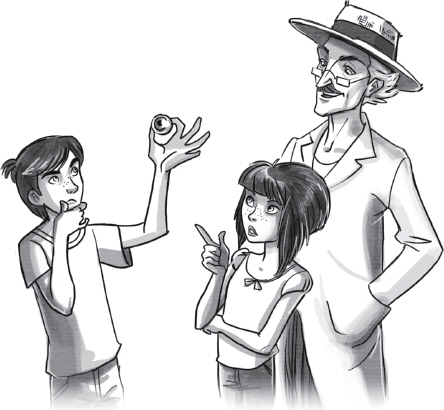
Ben and Zoe followed him eagerly along the corridor to the Control Room and placed their fingertips on the ID pad.
“Print identification complete,” came the electronic voice.
The door swung open to reveal the centre of Wild's Headquarters â a brightly-lit room full of operatives at flashing control panels and busy computer screens.
Uncle Stephen went over to a touch screen and brought up an Internet blog. “This was posted today,” he told them. “It's from a vet in an Inupiat community in Fairwood, Alaska. I often read Theo Airut's entries because he sounds a decent bloke who cares for the animals in the area. And it keeps me up to date with events out there. Erika has set the computer to flag up any problems and this certainly got the alarm bells ringing â well, we don't have actual alarm bells of course, far too noisy.”
Zoe read the blog aloud. “âA local man brought the body of a polar bear into the village today.'” She sighed. “How sad!”
Ben scrolled down the entry. “âHe'd gone out on a fishing expedition and the bear attacked him. He had to shoot it to save his own life. Then he brought the body back for its fur.'”
“Theo asked to see the body,” Uncle Stephen told them. “He's posted several recent entries about the bears not getting enough to eat and he wanted to check this one out. It's very unusual for a polar bear to attack a human, but this one appears to have been starving.” He looked grave. “I'm afraid global warming is taking its toll on their numbers. I'm sure you've heard all about the polar ice cap getting thinner.”
Ben and Zoe nodded.
“Seals normally build their birth lairs in the thick ice shelves, but because the ice has been thinner these last few years the seals can't breed as well.”
“And seals are the main source of food for polar bears,” said Zoe.
“Indeed.” Uncle Stephen nodded. “The seals are full of fat, which in turn gives the polar bear a thick fat layer. This keeps them warm and enables them to go without food for long periods.”
“Wait a minute,” said Ben, puzzled. “If this bear's already dead, what's our mission?”
“The vet's examination showed something particularly worrying,” Uncle Stephen continued. “The dead bear was a lactating female.”
“That's awful!” gasped Zoe. “It means there could be motherless cubs out there in the wild.”
“The Arctic can be a very hostile terrain,” said Dr Fisher. “This mission will be your most difficult yet. You need to find those cubs before it's too late.”
Ben and Zoe gazed at each other in excitement. This was like nothing they'd ever done before.
“Any clues to where we should look?” asked Zoe.
“The blogger didn't say where the bear attacked,” said Uncle Stephen. “That's something you'll have to find out when you get there.”
“I don't suppose she would have strayed far from her cubs,” said Ben thoughtfully. “Polar bears build birthing dens, don't they? They make them in the snow on the land and stay in them for months.”
“They do,” said Uncle Stephen.